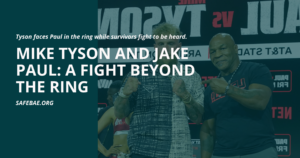Mike Tyson and Jake Paul: A Fight Beyond the Ring
Tyson faces Paul in the ring while survivors fight to be heard.
The Fight Beyond the Ring
As the world gears up for Mike Tyson’s long-awaited return to the boxing ring this weekend, there’s another story simmering just beneath the surface. For many, Tyson’s fight against Jake Paul at AT&T Stadium is a spectacle—a heavyweight legend stepping back into the spotlight. But for survivors and advocates, his comeback is a stark reminder of an unresolved past.
In 2023, a woman came forward with a lawsuit alleging that Tyson raped her in the 1990s, joining a long history of accusations tied to his name. While fans debate his legacy and the fight’s odds, this lawsuit paints a far darker picture—one that cannot be ignored. These moments challenge us as a culture to confront uncomfortable truths about power, fame, and accountability, and to ask ourselves: How do we balance celebration with justice?
For organizations like SafeBAE, Tyson’s story is not just about what happens in the ring. It’s about the survivors whose voices are often drowned out by the noise of fame. It’s about the ongoing fight to ensure their stories are heard and their experiences are validated.
Tyson’s Past and the Survivor’s Perspective
While Mike Tyson’s boxing career is celebrated as one of the greatest in history, his legacy outside the ring tells a much more complicated story. In 1992, he was convicted of raping Desiree Washington, a pageant contestant, and served three years in prison. Over the years, Tyson has faced other allegations of sexual misconduct. In 2023, a woman filed a lawsuit in New York, alleging that Tyson raped her in the early 1990s after meeting him at a nightclub. She described the physical, emotional, and psychological harm she endured, seeking justice decades after the incident. Additionally, Tyson has been accused of other incidents of inappropriate behavior, including groping a woman on an airplane in 2022, further compounding the troubling allegations against him.
For survivors, hearing these stories can feel retraumatizing, especially when the narrative focuses more on Tyson’s comeback than the pain of those he harmed.
It takes immense courage for survivors to come forward, especially against someone as powerful and culturally significant as Tyson. The risks are steep: scrutiny, disbelief, and a media landscape that often favors the accused. But their bravery highlights a critical truth—these stories need to be heard, and justice should never be sidelined for the sake of entertainment.
Accountability Requires Action, Not Just Words
While Mike Tyson issued an apology during his 1994 prison sentence for rape, there’s little evidence of sustained accountability since then. His letter to the judge described his actions as “inexcusable,” but for many survivors, accountability means more than words—it means action.
Among Tyson’s fanbase, particularly men who admire his legendary status in boxing, there’s a common response to his history of sexual violence: “He did his time; it was decades ago. What more do you want?” This sentiment reflects a broader cultural reluctance to grapple with the lasting harm caused by violence against women, especially when the accused holds iconic status. For some, the passage of time feels like enough to move on. But for survivors, the pain and trauma don’t adhere to a timeline.
So, what does moving forward look like? It starts with acknowledging that harm doesn’t disappear with time. Survivors carry the weight of their experiences for years, often in silence, while public figures like Tyson are celebrated without addressing the full scope of their actions. Moving forward means shifting the focus away from justifying or excusing past behavior and instead asking: How do we ensure this doesn’t happen again?
For Tyson and others in his position, accountability must go beyond apologies. It could mean actively supporting survivor-led initiatives, funding education on consent, and using their influence to speak out against violence. For fans and the public, it requires a willingness to hold their icons accountable and recognize that greatness in one arena does not erase harm in another. It’s about challenging the reflex to dismiss survivors’ pain in favor of preserving celebrity status.
True accountability is about more than what happened decades ago—it’s about shaping a future where violence against women is taken seriously.
The Role of the Next Generation in Shaping Accountability
Jake Paul represents a younger generation of influencers with enormous power to shape cultural conversations. Figures like Paul, with massive platforms and the ability to influence millions of young fans, have a unique opportunity—and responsibility—to take a stand on critical issues like violence against women.
By agreeing to fight Tyson without acknowledging the serious allegations and history of harm tied to his name, Paul risks sending the wrong message to young men: that fame and entertainment can take priority over accountability.
It’s unfortunately unsurprising that someone like Jake Paul has chosen to remain silent on these issues. Paul himself has faced serious accusations, including allegations of sexual misconduct and criticism for using racial slurs. In 2021, TikTok star Justine Paradise accused him of sexual assault, a claim followed by another woman alleging inappropriate behavior in 2017. In 2018, Paul was caught on video using the N-word during a freestyle rap. These controversies highlight the critical importance of holding public figures accountable—not just for their own actions but for the influence they wield over young audiences.
But it doesn’t have to be this way. Caring about violence against women shouldn’t be controversial—it is literally the bare minimum.
Changing the Narrative, Supporting Survivors
Mike Tyson’s return to the spotlight serves as a reminder of how far we still have to go when it comes to addressing violence against women and holding powerful individuals accountable. At SafeBAE, we believe that every survivor’s story matters and that real change happens when we amplify their voices and challenge the cultural dynamics that excuse harm.
This fight isn’t just about one person or one case—it’s about shifting a culture that too often prioritizes fame over justice. By providing education on consent, healthy relationships, and bystander intervention, SafeBAE empowers young people to lead this change in their own communities. We believe in teaching the next generation to stand against violence in all its forms and to foster a world where accountability is non-negotiable.
Help us continue this critical work. Your support allows us to create resources, lead workshops, and advocate for survivors everywhere. Together, we can build a future where stories like these are no longer normalized—and where every survivor is seen, heard, and supported.
Join the Movement: Visit SafeBAE.org to learn more, donate, or get involved today.


